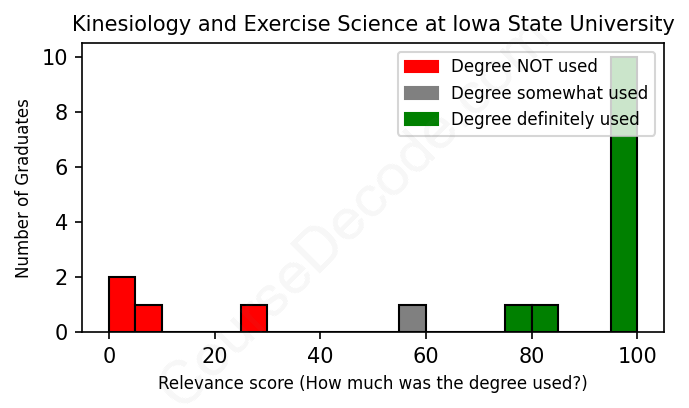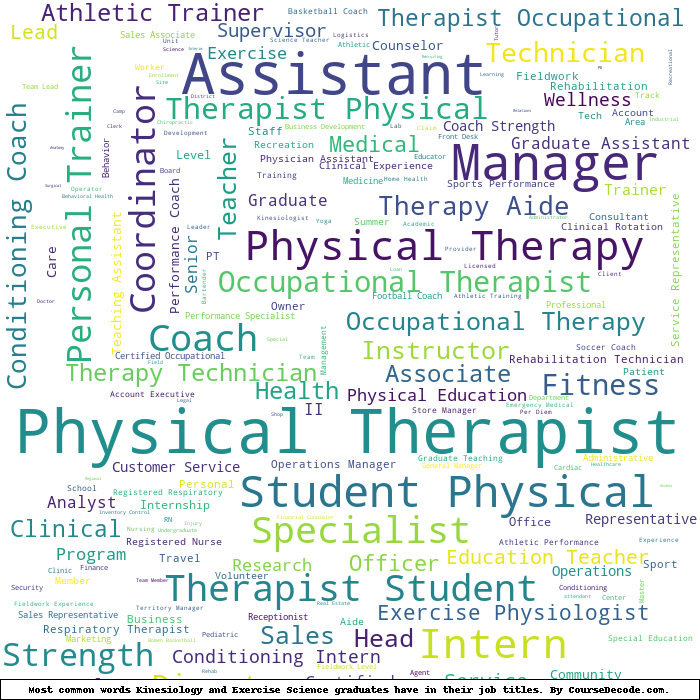
First, some facts. Of the Kinesiology and Exercise Science graduates from Iowa State University we've analyzed , here's how many have used (or NOT used) their degree in their career:

These are estimates based on AI analysis of 17 LinkedIn profiles (see below).
The verdict? Above average. Overall, with an average relevance score of 73%, Kinesiology and Exercise Science graduates from Iowa State University have a higher likelihood (+6%) of finding work in this field compared to the average graduate across all fields:
And for comparison, here's the chart for all profiles we've looked at across all degrees.
Also, after graduating, 52% of these graduates have pursued further education other than another Bachelor's degree (such as a Masters degree or other), compared to the average across all profiles of 35%. This suggests you may need more than just a Bachelors degree to be competitive as a Kinesiology and Exercise Science graduate.
See the details:
|
Relevance score: 100% We think this person has gone into a career highly relevant to their degree. We think this person has gone into a career highly relevant to their degree.
DEGREE INFOGraduated in 2015 from Iowa State University with a Bachelor of Science - BS in Kinesiology and Exercise Science. No other secondary education since. JOB HISTORY SINCE GRADUATIONFitness Manager Eastcastle Place Oct 2018 - Present ABOUTNo information provided. |
The top 10 most common jobs done by the graduates we've analyzed (ranked most common to least) are:
When looking at the job paths of those who graduated with a degree in Kinesiology and Exercise Science from Iowa State University, you can see that a number of them ended up in jobs directly related to fitness and health, such as Personal Trainers and Fitness Managers. These roles clearly connect to what they studied, focusing on exercise prescription, client assessment, and overall wellness. Positions like Group Fitness Instructor, Health Fitness Specialist, and Sports Performance Director are also quite common, indicating a solid alignment with their academic background. It’s good to see that many grads are applying their knowledge in ways that make a direct impact on individuals' health and fitness.
However, not everyone found a role that relates well to their degree. There are quite a few graduates working in unrelated fields like project management, construction, and various internships in the pharmaceutical domain. For these individuals, while they may have gained useful skills in those positions, it doesn’t directly relate to Kinesiology or Exercise Science. This divergence suggests that while there are many relevant opportunities out there, some graduates may need to look outside the box or might not be using their degree in the most aligned way possible. Overall, it’s a mixed bag: while many are doing awesome work in fitness and health, there’s still a chunk who’ve landed in roles that don’t tap into the core of what they learned in school.
Here is a visual representation of the most common words in job titles for Kinesiology and Exercise Science graduates (this is across all Kinesiology and Exercise Science graduates we've analyzed, not just those who went to Iowa State University):

When we look at the career paths of graduates from Iowa State University who studied Kinesiology and Exercise Science, it’s pretty clear that a significant number have landed in relevant fields shortly after graduation. Many of their first jobs were in personal training, fitness management, and health promotion roles. For instance, recent graduates have taken on positions like Personal Trainer, Fitness Manager, and Health Fitness Specialist. This trend shows that a lot of them kick off their careers by applying their degree directly in fitness and wellness environments, which is great for gaining real-world experience. However, it's worth noting that some graduates seem to have taken unexpected turns, venturing into areas like construction management or sales, which may not be directly aligned with their studies in Kinesiology.
Fast forward five to ten years, and we see a mix of outcomes. A decent number have transitioned into more specialized positions within the health and fitness world, such as group fitness instructors, fitness directors, or even roles in healthcare systems like physician assistant and pharmacy technician positions. On the flip side, others have found their way into completely different industries, which may indicate a struggle to find roles directly related to their degree. Overall, while many graduates remain in fields closely tied to Kinesiology and Exercise Science, there’s a notable portion that has branched out into unrelated careers, suggesting that the degree does offer flexibility, but perhaps not a guaranteed pathway in the fitness and health sectors. It's a mixed bag, but many do seem to carve out successful, relevant careers in the long run!
Honestly, pursuing a Bachelor’s degree in Kinesiology and Exercise Science at Iowa State University, or pretty much anywhere, strikes that balance between being challenging but definitely doable if you're into it. You’ll dive deep into subjects like anatomy, biomechanics, and exercise physiology, which can be tough if you're not into the science-y stuff. But if you’re passionate about health and fitness, it can actually feel engaging and rewarding. The workload varies, with some classes being more intense than others, especially when it comes to practical labs and group projects. Overall, it's not the easiest degree out there, but if you stay organized and motivated, you'll likely find it a solid fit!
Most commonly, in the LinkedIn profiles we've looked at, it takes people 4 years to finish a Bachelor degree in Kinesiology and Exercise Science.
Looking at the career paths of these Kinesiology and Exercise Science graduates from Iowa State University, it seems like they're all finding their ways into various niches of the fitness and health fields, but the money situation varies a lot. Some, like the Personal Training Director, probably make decent salaries since they're in management roles, while others have a mix of internships and lower-paying positions, especially in the early years. It's worth noting that the personal trainer and fitness instructor jobs, while often rewarding and fun, typically don't pay as well unless they're in higher roles or have a solid clientele. Overall, some have definitely landed decent gigs that pay well, but others might find themselves hustling a bit more to make ends meet. So, if you’re thinking about this path, it seems important to keep your options open and maybe consider advancing into management or specialized roles to boost your earnings!
Here is a visual representation of the most common words seen in the "about" section of LinkedIn profiles who have a Bachelor degree in Kinesiology and Exercise Science (this is across all Kinesiology and Exercise Science graduates we've analyzed, not just those who went to Iowa State University). This may or may not be useful:

Here are all colleges offering a Bachelor degree in Kinesiology and Exercise Science (ordered by the average relevance score of their Kinesiology and Exercise Science graduates, best to worst) where we have analyzed at least 10 of their graduates: